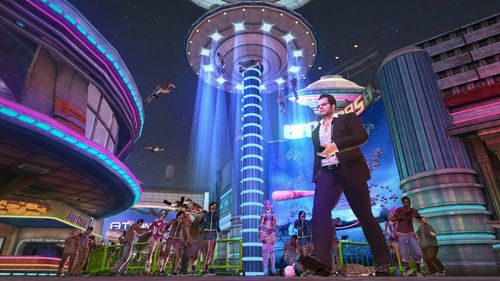 As the end of this generation draws near we’re seeing an increase in the amount of franchises that are taking a stab at faster release cycles. Call of Duty has been pulling this trick for a while but even titles with a bigger scope like Assassin’s Creed and Dead Rising are trying to give us a new game every year.
As the end of this generation draws near we’re seeing an increase in the amount of franchises that are taking a stab at faster release cycles. Call of Duty has been pulling this trick for a while but even titles with a bigger scope like Assassin’s Creed and Dead Rising are trying to give us a new game every year.
The term “new game” may be a bit of a stretch because in the rush to meet the deadlines a lot of these titles are getting flak for not adding enough to previous iterations. While waiting years for a game may be painful, is it preferable to basically buying what equates to an expansion pack?
I’ve been playing Call of Duty: Modern Warfare 3 for the past week and I’ve really stated to notice how much that game is showing its age. Back in 2007 the kind of visuals it was pulling (at 60 frames per second, no less!) were stunning, but as time has gone on Call of Duty’s visual style has become noticeably long in the tooth. Compared to Battlefield 3, which has such a strong visual style, CoD felt laughably old in some parts. There’s a raid on an African village mid-way through the game where you can actually see the low polygon count of the background, stuff so bad it looks like it was ripped out of a PlayStation One game.
That’s not even taking into account just how robotic and old fashioned controlling your character feels. The shooting is still as competent as ever, but you really do feel like you’re controlling a gun with a camera and locked legs attached to it. Instead of vaulting smoothly over obstacles like in Battlefield 3, MW3 instead has you awkwardly mount them and jerk over, every indication that you’re controlling a real person disappearing from the screen. Actual discernible kinetic movement has been one of my favorite innovations of this genre, and having one of the biggest titles in gaming lack (and many other things) is starting to get noticeable.
This isn’t really supposed to be a BF3/MW3 comparison rant, but you can really tell that years of work went into the Frostbite 2 engine and the tech behind Call of Duty is struggling to stay relevant. Imagine if Halo: Reach had used the exact same engine as Halo 3 or ODST? ODST felt very outdated when it came out in 2009 so an engine that was old back in 2007 (albeit with some appealing coats of paint) is doing more harm than good. True, this generation is coming to a close, but how much longer will Activision keep using the same technology to power Call of Duty? That franchise needs to be taken out of its yearly rotation if Activsion doesn’t want to run it right into the ground before they find their next big thing (not that they’re not trying).
Assassin’s Creed was not a franchise I expected to be seeing every year, but I guess the game is making quite the bank for UbiSoft, so here we are with our third adventure with Ezio Auditore in as many years. Now, I haven’t had time to play Revelations personally, but I’ve watched a friend of mine play through pretty much the entire game. I acknowledge that that doesn’t give me carte blanche to make judgements about the game (in fact you should take this entire section with a huge grain of salt), but aside from the freakish Uncanny Valley eyes of the cast and the new locale, there’s little to distinguish Revelations from Brotherhood or Two. You go around, buy shops, kill Templars and hunt for hidden items in tombs. It’s hard to believe that additions that were called revolutionary for the franchise only three years ago have now become formulaic and predictable.
When you look at a game like Skyrim, which offers hours upon hours of fresh, exciting content in a beautiful world, or Saint’s Row the Third, which tries so hard to get away from all the tropes we’ve come to expect from gameing, it’s hard to believe that titles that don’t bother to add anything or deviate from their release cycles continue to sell so well.
It’s a case of “if it ain’t broke, don’t fix it”, but even the most high-performance car needs a tune-up after a while. I like Assassin’s Creed a lot, but can I stomach one of these every year? I tried the multiplayer and co-op of Modern Warefare 3 and even that failed to engage me. The Spec Ops missions were less creative than those of Modern Warfare 2, and the ridiculous amount of leveling hooks added to multiplayer (your gun ranks up in addition to you, your perks and whatever else they can attach experience points to) made me roll my eyes. That isn’t innovation or reinventing yourself, that’s adding more glitter to distract from the fact that there’s nothing different from last year.
That’s not even counting the fact that these titles are still being sold for full price. Microsoft and Campcom at least had the decency to sell their smaller scale titles at a discounted price. Heck, Sonic Generations, which I’ve enjoyed immensely, wasn’t even a full priced game.
The games industry is in kind of a holding pattern right now. We probably won’t see new things until the next generation and that bums me out a little bit. I still buy Assassin’s Creed and CoD games, so I’m part of the problem, but eventually this policy is going to come back and bite publishers in the ass.
What do you guys think? What are your thoughts on annualization?



I think that annual installments of games are definitely a problem for the industry. I agree with many of the points in the article, there simply isn’t enough time for proper innovation with the game’s mechanics if a new game is released every year.
Most of the time, you just need a break from the game. It gives people a chance to actually want the game and look forward to the new one. If people always have their games available without at least a decent break, they’d eventually get bored of it. I remember how excited I got while waiting for Assassin’s Creed 2, and I wasn’t disappointed, Assassin’s Creed 2 is still one of my favorite games because of how they changed the flow of the game and the different mechanics.
Publishers should give long enough breaks between their games to keep people interested, and entertained by the new innovations that the developers have time to include. But they’re just looking out for their bottom line, that is why they make the games in the first place.
major fps deadline time vs valve time.
pick your poison.
I didn’t even have time to play Brotherhood yet, I’m not ready for Revelations. At least with Assassin’s Creed I feel like I’m missing out on some really good story, but I know that it is going to be there whenever I get around to them. With CoD, I don’t feel the need to spend $60 every year to basically play the same game. I didn’t for CS:Source, because CS 1.6 was still thriving. Battlefield BFBC2 is still engaging enough that I haven’t picked up Battlefield 3 yet (okay, the biggest reason is all the other games to play).
I really don’t like a franchise release every year (sans sports games of course). Take a look at valve. While I actually liked L4D2 quite a bit more than L4D, people complained about it’s quick release. But then people also complain about the wait for HL3 / EP 3. Can’t make everyone happy, especially gamers. Just gotta think less about the time and focus on the product. I feel like an every year repaint of CoD is just unnecessary.
Annualization is definitely a tall order for a full retail priced title. I’m still on board with Assassin’s Creed, but largely because they’ve kept me intrigued by the plot. After Revelations, I’m pretty sure I won’t be sold on another sequel at full price without some significant innovation. Bottom line – if you can deliver an annual release with some solid gameplay and a consistently engaging plot without your engine looking horribly outdated, I can’t really argue with that…but if you plan to continue, you’d better have some changes brewing for the 3rd or 4th release. If we’re talking about a Call of Duty – I just can’t see sustaining success for very long in an annual release scenario.
I have read some very mixed things about Revelations, but I did hear that Ubisoft said after the next game, AC 3, they will stop the annual releases, which sounds like a very smart move.
I really wish Assassin’s Creed hadn’t gone annual. I really enjoyed Assassin’s Creed for its atmosphere and simple yet innovative & refined gameplay. AC2 had too many extra features that really just ended up being menu-surfing (buying new shops and weapons wasn’t necessary; Altair had epic battles with just his sword & knives). This is a personal quip, but the atmosphere also kinda decayed. Ezio walked around the cities a bit too easily; the cities felt like hubs for RPG-ish stuff, not dungeons designed to test your navigation and stealth strategy. As more ACs came out, more features were added to the point where Ubisoft caked make-up onto AC’s core gameplay, instead of adding a few tweaks and equipment that were important changes to strategy. To me, the Assassin’s Creed series ended with AC2. Brotherhood and Revelations were made by some loony bunch of fanboys. lol
I really hope enough developers and publishers realize the necessity for games to have enough years to make quality titles. The difference between a game that comes out per year as opposed to per 3 years is huge. The fact that fans have to wait for games that take longer to create means they’ll get hyped and the final product will most likely satisfy them and make them want more in 3 years. If releases are too frequent, people get bored and insulted.
Speaking of discounts on smaller-scale games, I think that’s the way to determine pricing for games in the future. AAA games with 40 hours of singleplayer gameplay (including replays with changes that significantly impact gameplay and story) or a well-constructed multiplayer (dozens of maps, enough unique and innovative gametypes, consistent developer involvement and balancing) warrant full price. Small-scale games developed by small teams, or in short development periods, or with less resources than AAA titles, could be released at a lower price. It’s about matching the cost with the resources and gameplay hours.
Annualisation is generally a bad idea, leaving little time to innovate and even less time for the employees to take a break from the game. Usually when people step away from a game they can come back fresh and happy to work. After my experience working on an annual title i can safety say it can be difficult to become motivated when you’ve just spent 10 months making a game to go ahead and start on the next iteration. Saying that it can work if the staff are really keen on making the next version which is what i think happened with L4D2, Valve were keen to make L4D better and it shows.